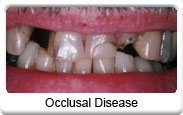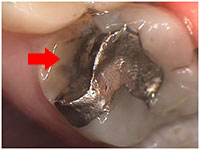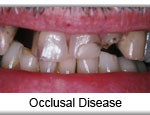History quoted Ben Franklin saying, “nothing is certain but death and taxes.” In dentistry, the adage: “muscles always win, and teeth always lose” carries similar credibility.
Occlusal Disease is a term used to describe damaged teeth resulting from tooth clenching and grinding.

Occlusal damage related to TMJ
Signs of Occlusal Disease may include:
-
Advanced wear through the outer protective enamel layer.
-
Rough, sharp, or small “chipping” of the upper and lower front
teeth edges. -
Small “notches” at the gum-line of selected teeth. This can often be
associated with gum recession and tooth sensitivity. -
Teeth with small fracture lines indicative of high stress.
-
Teeth or fillings with cracks or fractures without traumatic injury.

Occlusal damage -broken tooth
Dentists face a daily request for cosmetic bonding, porcelain veneers, ceramic crowns, and even implants to replace missing front teeth in our aesthetic-conscious society. Patients want to reestablish the youthful look that society places so much emphasis upon.
Esthetic dentistry requires careful analysis of one’s occlusion or “bite” for any esthetic prosthesis’s long-term success. “Muscles always win, and teeth always lose.” Nothing man-made can withstand the muscles forces in the face that close our jaw and allow us to chew our food. The muscles of mastication (chewing), as they are called, commonly destroy the hardest substance in the human body; enamel.
How does one provide predictable, long-lasting esthetic dentistry for patients suffering from unnatural teeth wear? In other words, how can one provide esthetic dentistry that is not destroyed by natural enamel or porcelain banging against each other? The answer is to correct the problems that destroyed the original enamel and ultimately destroy even the strongest crown or veneer.
Chewing food is not accomplished by just the teeth. Mastication involves the teeth, the muscles of mastication, and, equally important, the head of the jaw or condyle in the base of the skull. But, if the position of the condyles and the teeth are not in the proper relationship when teeth touch, the muscles of mastication “turn on,” creating undue stress to anterior teeth. Suppose one can develop an occlusal relationship or bite where ONLY anterior teeth hit when the jaw slides forward or laterally, and the condyles are in the proper relationship. In that case, proprioceptive innervation that “turns on” the muscles of mastication is not activated, and thus one can achieve beautiful esthetic results with crowns, veneers, bonding, or implants. If posterior teeth hit when mastication muscles move the jaw forward or laterally, the muscles “turn on” and destroy any man-made prosthesis or the natural enamel one was born with.
We all have friends who spend thousands of dollars on esthetic dentistry that failed quickly. The treating dentist overlooked the muscle-joint-teeth relationship. The first step in any esthetic dentistry treatment plan should be an analysis of the triad of influencing factors that determine long-term success. Stone casts or study models can be made and mounted on an articulator, a hinge that mimics the relationship between the teeth and joint. Often through minor adjustments to posterior teeth or careful planning of the shape of restorations on posterior teeth, one can influence the “turning off” or “turning on” muscles of mastication. If posterior teeth don’t touch when anterior teeth do, almost any type of crown, veneer, or bonding placed on an anterior tooth will serve a long and pleasing life.
If you suffer from worn or chipped teeth, a solution to your occlusal disease must come before anterior restorations are placed to mimic what Mother Nature intended. If not planned properly, your muscles will win, and your bonding, veneers, crowns, or implants will lose too.
See your dentist and discuss a plan that best meets your needs and your mouth’s condition.
Comprehensive dental care for maintaining function and good hygiene can prevent tooth loss and other oral health problems.

First State Dental
Phone: (302) 652-5312

